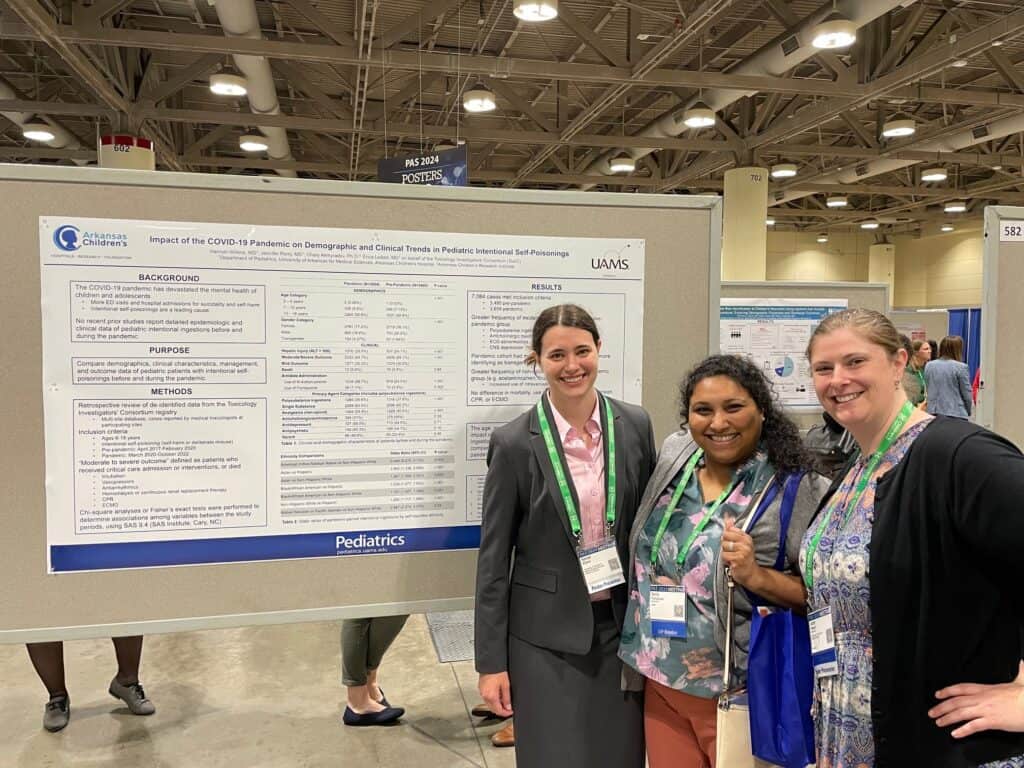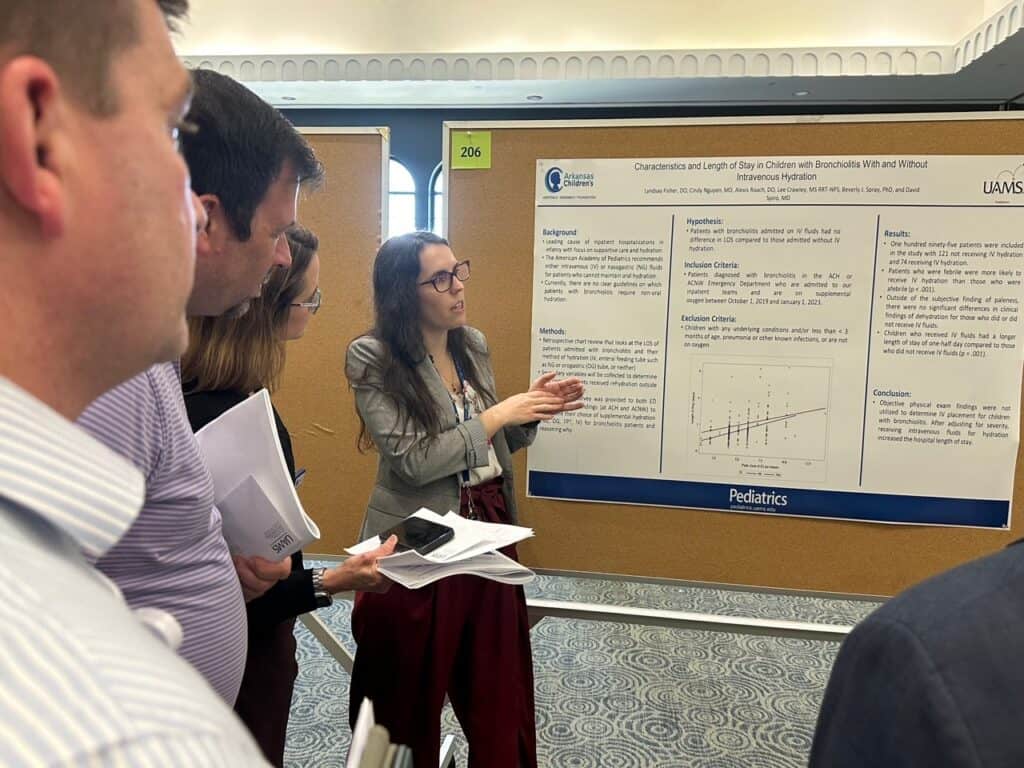The PEM section is committed to research and collaborates on several projects with multiple pediatric subspecialties.
Addressing Critical Needs
The PEM section is committed to research and collaborates on several projects with multiple pediatric subspecialties. Our faculty and fellows collaborate to drive research and innovation across all areas of emergency medicine.
Pediatric Emergency Medicine Research
Pediatric medicine is about improving the lives of children on a daily basis. This extends to our mission of treating patients in the best way possible to drive superior outcomes. Our faculty are dedicated and driven to advance the science of emergency care.

Trainees and faculty members present at the premier national and international pediatric conferences.
Research Opportunities During Fellowship
A great deal of emphasis and protected time is given to fellow’s research. Fellows are allocated 12 months throughout their three years for research. A dedicated research assistant works with the fellows throughout their training and assists with project design, IRB and grant submission, data collection and recruitment, conference presentations, and maintains a research binder for each fellow.

Each fellow has an individual mentor, as well as a Scholarship Oversight Committee, to provide guidance and feedback throughout the fellowship. The expectations for fellow research are as follows:
- An independent research project that culminates in a first author paper ready for journal submission prior to graduation
- A smaller administrative project involving some aspect of QA/QI for the hospital or department
- Each of our fellows participates in writing a review article on a wide variety of topics that results in a publication
- Fellows submit a case for Emergiquiz or PemPix during the fellowship
- National Fellows Conference – Held in the spring of each year, first-year fellows attend this conference where they get an opportunity to present their research ideas to leaders in the field of PEM and receive feedback and guidance
- Presentation at the department’s annual fellows research day
- Presentation at national meetings and conferences is encouraged and supported with funding
Recent Peer-Reviewed Publications
- Pantoprazole is a proton pump inhibitor indicated for the treatment of gastroesophageal reflux disease, a condition that disproportionately affects children with obesity. Appropriately dosing pantoprazole in children with obesity requires understanding the body size metric that best guides dosing, but pharmacokinetic (PK) trials using traditional techniques are limited by the need for larger sample sizes and frequent blood sampling. Physiologically-based PK (PBPK) models are an attractive…
- No abstract
- Changes in Residency Applicant Cancellation Patterns with Virtual Interviews: A Single-site AnalysisCONCLUSION: While limited, at our site, changing to a virtual interview format correlated with fewer cancellations overall. The proportion of cancellations within 14 days was much higher during virtual interview seasons, with most cancellations occurring during that time frame. Additional studies are needed to determine the effects of cancellation patterns on emergency medicine recruitment.
- The incidence of pediatric pulmonary embolism (PE) has increased by 200 % in the last decade, but at a single center, it is still infrequent. Given the unique epidemiologic features of pediatric PE, diagnosis is often delayed, and the management is empiric, based on individual physician experience or preference. Thus, there is a strong need for center-specific uniform management of pediatric PE patients. In adults, the development of pulmonary embolism response teams (PERTs) or PE […]
- No abstract
- We present the case of a child impaled in the face by a meat thermometer who subsequently suffered a significant complication due to the administration of hydrogen peroxide to the wound. The soft tissues of the face rapidly expanded and blanched, the child experienced mental status changes, and imaging revealed massive subcutaneous emphysema, pneumomediastinum, and pneumo-orbit. Herein we review the literature on this rare complication and provide photodocumentation in the hopes that other…
- CONCLUSIONS: The proportion of PED injury-related visits in March through December 2020 increased compared to the same months in 2019. Racial and payor differences were noted. Mechanisms of injury seen in the PED during 2020 changed compared to 2019, and this can inform injury prevention initiatives.
- CONCLUSION: In patients with gastroparesis presenting to the ED, droperidol reduced opioid use, improved pain control, and decreased antiemetic use without any differences in MME per dose, length of stay, hospital admission rate, or cost.
- BACKGROUND: Tuberculosis (TB) is one of the leading causes of infectious disease, and emergency medicine providers are often the first physicians to encounter patients with untreated or undiagnosed disease.
- No abstract
- Antimicrobial resistance increases infection morbidity in both adults and children, necessitating the development of new therapeutic options. Telavancin, an antibiotic approved in the United States for certain bacterial infections in adults, has not been examined in pediatric patients. The objectives of this study were to evaluate the short-term safety and pharmacokinetics (PK) of a single intravenous infusion of telavancin in pediatric patients. Single-dose safety and PK of 10 mg/kg telavancin…
- Introduction: Ensuring high-quality scholarly output by graduate medical trainees can be a challenge. Within many specialties, including emergency medicine (EM), it is unclear what constitutes appropriate resident scholarly activity. We hypothesized that the quantity and quality of scholarly activity would improve with a clearer guideline, including a point system for eligible scholarly activities. Methods: A resident Scholarly Activity Guideline was implemented for EM residents in a university…
- No abstract
- CONCLUSIONS: Increased susceptibility to APAP toxicity requires loss of both the MPC and ALT2 in vivo, indicating that MPC inhibition alone is insufficient to disrupt redox balance. Furthermore, the results from ALT2 induction and dichloroacetate in the APAP model suggest new metabolic approaches to the treatment of liver damage.
- Forensic laboratories need quick and simple technology to improve turnaround times, while delivering reliable results. The goal of this study is first to create a simplified workflow to meet new Academy Standards Board requirements for urine testing in drug-facilitated crime investigations and, second, to create "ready-to-go", "hands-free" testing technology to further streamline analytical procedures. A first of its kind, the ToxBox forensic test kit is used to validate a single analytical…
- CONCLUSIONS: Severe outcomes occurred for different reasons and were largely associated with the patient's age. Young children, all of whom were exposed to edibles, were at higher risk of severe outcomes. Teenagers with severe outcomes were frequently involved in polysubstance exposure, while psychosocial factors may have played a role.
- Objective: Assess university students' SARS-CoV-2 antibody seroprevalence and mitigation behaviors over time. Participants: Randomly selected college students (N = 344) in a predominantly rural Southern state. Methods: Participants provided blood samples and completed self-administered questionnaires at three timepoints over the academic year. Adjusted odds ratios and 95% confidence intervals were estimated from logistic regression analyses. Results: SARS-CoV-2 antibody seroprevalence was 18.2%…
- CONCLUSION: Using medical and pharmacy student volunteers as COVID-19 vaccine screeners was successful, and brief education provided by the students led to a modest increase in vaccine acceptance, with overall acceptance of 31.5%. Numerous educational benefits are described.
- CONCLUSION: Survivors of mass shootings have substantial morbidity and characteristic injury distribution, but 37% of victims had no GSW. Law enforcement, emergency medical systems, and hospital and ED disaster planners can use this information for injury mitigation and public policy planning. The BIDM is useful to organize data regarding gun violence injuries. We call for additional research funding to prevent and mitigate interpersonal firearm injuries, and for the National Violent Death…
- CONCLUSIONS: Computerized mental health screening did not result in further psychiatric diagnoses or treatment; it also did not significantly reduce patient ED return visits. Collaboration among EDs and mental health treatment agencies, organizations, and researchers is needed to facilitate appropriate treatment referrals and linkage.
